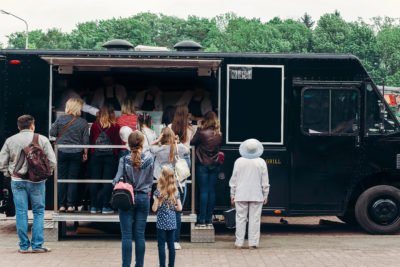|
Listen To The Article
|

Chicago’s food truck surveillance ordinance could violate the Fourth Amendment’s ban on unreasonable search and seizure.
The city of Chicago has been conducting food truck surveillance since 2012. As an illustration, it equips each food truck with a device that reports its location to authorities every five minutes.
Authorities are apparently enforcing a law that prevents food trucks [1] from operating within 200 yards of a restaurant. The city designed food truck surveillance to protect eateries from competition, American Conservative writer Dan King charges. For example, a food truck owner caught within 200 yards of a restaurant faces a $2,000 fine.
In particular, King compares food truck surveillance to the type of surveillance normally used on criminals and terrorists. This procedure involves a GPS device that reports the truck’s location to city regulators.
Anybody can ask the city for food truck surveillance data, the Institute for Justice (IJ) alleges. Consequently, a restaurant owner could learn which food trucks [2] were operating in his or her neighborhood.
Is Food Truck Surveillance Constitutional?
Chicago’s food truck surveillance ordinance could violate the Fourth Amendment’s ban on unreasonable search and seizure. The IJ is challenging Chicago’s food truck regulations on Fourth Amendment grounds in a lawsuit.
In essence, the GPS requirement [3] violates the Fourths Amendment’s ban on warrantless searches, as Timothy Snowball writes in The Hill. As a result, it should be safe to say that food truck surveillance is unconstitutional.
“IJ’s lawsuit argues that Chicago cannot protect restaurants from competition and that the GPS requirement constitutes an illegal search under the Illinois Constitution,” a press release states.
The Institute sued Chicago on behalf of food truck operator Laura Pekarik in 2012 for the purpose of overturning the regulations. However, a Cook County Circuit Court ruled on behalf of Chicago in December 2016, and a state appellate court reportedly sided with the city in 2017. The Illinois Supreme Court is still reviewing Pekarik’s case at the present time.
City Supports Food Truck Surveillance
Mayor Rahm Emanuel, a Democrat, initially introduced food truck [4] regulations that successfully passed in 2012. Notably, the regulations ban food trucks from operating in vacant lots and also from being in service between 2 a.m. and 5 a.m.
Ultimately, only one member of Chicago’s 46-member council voted against food truck surveillance, The Chicago Tribune reports. Alderman John Arena opposed the regulations because they favored brick and mortar eateries over food trucks.
“The brick and mortar restaurant lobby got ahold of (the plan) and it was stuffed with protectionism and baked in the oven of paranoia,” Arena said in 2012.
“No matter how hard Mayor Emanuel tries to convince us otherwise, there is no ‘culinary convenience’ exception to the Fourth Amendment,” Snowball declares.
You may also enjoy reading an additional Off The Grid News article: Are Your Phone Apps Secretly Monetizing You? [5]
Or download our free 47-page report that discusses the coming of the great American surveillance state: Surveillance Nation [6]
What are your thoughts on food truck surveillance in the city of Chicago? Let us know in the comments below.